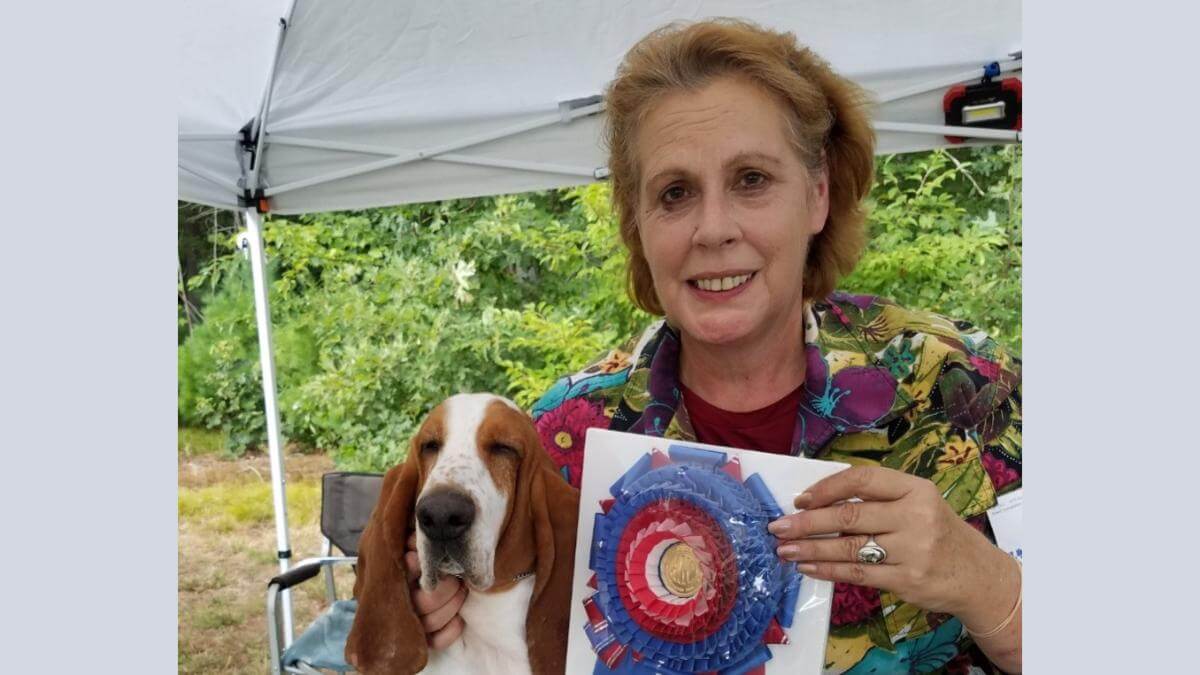
Home » Insights From Professional Handler Candy Carswell

Candy Carswell: I am originally from Long Island, where my parents had their kennel. I currently live in a small town in the northeast corner of Connecticut known as East Killingly. I have been in Connecticut for 25 years.
I have a small show kennel, so I am able to handle the dogs every day on a personal level and tend to their training and conditioning needs. I’ve been fortunate to work with some great, knowledgeable breeders over the years and also some great vets, large and small animal, who have expanded my knowledge. I believe in using holistic and chiropractic methods when helpful, for the dogs and for myself.
I am a third-generation dog show handler. My grandparents bred and showed Cocker Spaniels. My parents bred and showed English Springer Spaniels and Welsh Springer Spaniels. My father, Laddie Carswell, brought Welsh Springers into the US in the late 1950s and early ‘60s. He helped the Welshies become known to the fancy. He handled the first Welsh Springer, CH Fracas Little Caesar, to a Group placement at Westminster, and handled the English Springer Spaniel CH Wakefield’s Black Knight to Best in Show at Westminster in 1963.
The last litter of “DLCar” Welsh Springers was whelped in 2002. I stepped away from breeding my own dogs at that time, though I have co-bred Gordon, English, and Irish Setters as well as a few English Cockers with Mr. Collier Platt, Merrythought English Cockers, which I hope to continue in the near future. I currently assist my clients with breeding issues, as researching these issues has been a passion of mine.
I’ve been handling professionally since 1978, but started with my father at the age of 10. I started as kennel help, road assistant, and finally, partner, and then took over upon his retirement. Laddie handled for well over 60 years, mainly Sporting dogs, when he moved back to Long Island in the late ‘50s.
I was privileged to learn the business from the ground up; proper dog care and conditioning, basic trimming, and different trimming methods and blending them together. I learned to read a dog and what their needs are. No dog is the same.
Having a parent involved in the sport was a huge advantage, as was picking up useful methods and views from many of the big handlers of that time, which I am still grateful for as it’s made me a better handler in understanding each dog and what needs to be created, as I look at it as an art form. Some of the great mentors growing up were Anne & Jim Clark, Jane & Bob, Bill Trainor, Bobbie Fowler, Jerry Rigden, Dick Becker, Bobby Stebbins, and Frank Sabella, to name a few.
These people taught me well, increased my knowledge and broadened my views, and taught me how to keep an open mind and keep things in proper perspective.
Sharing their wealth of knowledge and advice was priceless. My father had a rule when I was working for him: watch, learn, ask questions, and listen. Education is key, and you never stop learning, which I still live by to this day.
Candy Carswell: Has judging changed? I think the quality of what is being shown has changed the most. We can educate our judges through judges education, but when what enters their ring doesn’t come close to what they were taught to be correct, there is a problem. Mind you, breeds do go through a low point but then rally back, hopefully. But we need to educate our new exhibitors/breeders, who hopefully will continue, to breed to the Standard of the breed, not change a Standard to fit what is being exhibited. Learn proper structure of your breed, movement, the form and function and genetics to breed better. Judges have my total respect, as I’ve watched rings/observed and I give them credit. It’s not easy at times when quality isn’t there and, class by class, it’s not getting better.
Personally, I feel there are too many shows. Clusters are okay, but I think there are limits. Too many shows competing for a limited amount of entries in an area causes clubs to suffer with lower entries if a cluster is too long.
Social media is good to a point, with taste and being positive, but we need to stay away from its negative presence. This negative stuff and bullying is just wrong. I personally limit my social media presence, and only pop in when I need to.
Candy Carswell: I think some of the changes to the Rules Applying to Dog Shows are good for the sport. Times have changed, and hence, some of the rules should evolve to our changing times.
I feel Reserve Best in Show should get some points rewarded. Earning points for a class dog with a Group placement or win, I am good with that. If a judge feels this animal in their Group is worthy of a placement, who care if it’s a class dog? In fact, in some of the rarer breeds, they are the only one and might be an outstanding representative of their breed. This is the only way for them to get their championship.
And in these changing times when entries are lower than what they have been, say, 10 years ago, I think rewarding Reserve Winners at a Specialty when they meet the requirements is a good idea.
Candy Carswell: Biggest challenges for the sport include:
Positive changes include:
For this sport to continue, we must get back to looking at things by being positive, and being helpful in a situation. Being negative only hurts this sport, and new exhibitors get turned off by the negativity. Ask yourself: “Are you helping the situation or are you contributing to the problem?”
Candy Carswell: I am a workaholic, whether it be with the dogs or doing home projects on weekends off. I also enjoy cooking and reading.